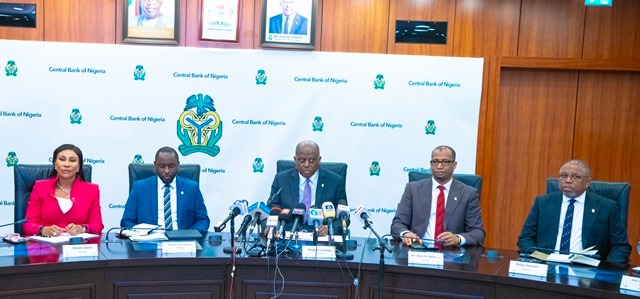The Central Bank of Nigeria (CBN) has said the country recorded a Balance of Payments (BOP) surplus of $6.83 billion for the 2024 financial year, showing a rebound from deficits of $3.34 billion in 2023 and $3.32 billion in 2022.
The CBN made this known in a statement by Mrs. Hakama Sidi-Ali, acting Director of Corporate Communications, on Wednesday.
The CBN attributed the development to sweeping macroeconomic reforms, improved trade dynamics, and renewed investor confidence.
It said the current and capital account recorded a combined surplus of $17.22 billion in 2024, adding that a major driver of this performance was a goods trade surplus of $13.17 billion, reflecting Nigeria’s stronger export profile and a significant reduction in import volumes.
Specifically, petroleum imports declined by 23.2 per cent to $14.06 billion, while non-oil imports dropped by 12.6 per cent to $25.74 billion, showcasing the impact of import substitution strategies and the push toward local refining.
On the export side, gas exports rose by 48.3 per cent to $8.66 billion, and non-oil exports grew by 24.6 per cent to $7.46 billion, as the government’s diversification efforts continue to yield results.
The CBN noted that personal remittances also played a pivotal role in stabilising the BOP position, as inflows rose by 8.9 per cent to $20.93 billion, underpinned by stronger engagement from the Nigerian diaspora.
International Money Transfer Operator (IMTO) inflows also soared by 43.5 per cent, reaching $4.73 billion, up from $3.30 billion in 2023.
In addition, official development assistance increased by 6.2 per cent to $3.37 billion, reflecting sustained international support and donor engagement with Nigeria’s reform efforts.
In the financial account, Nigeria recorded a net acquisition of financial assets totalling $12.12 billion, marking a recovery in capital inflows and market confidence.
Portfolio investments more than doubled, increasing by 106.5 per cent to $13.35 billion, while resident foreign currency holdings rose by $5.41 billion—an indicator of growing trust in the stability of Nigeria’s financial system.
Although foreign direct investment (FDI) fell by 42.3 per cent to $1.08 billion, the overall financial account posted substantial gains, largely supported by favourable portfolio flows and asset accumulation.
Nigeria’s external reserves increased by $6.0 billion, closing the year at $40.19 billion, enhancing the country’s external buffer and providing greater capacity for exchange rate defence and economic resilience.
Significantly, net errors and omissions fell by 79.5 per cent to negative $5.10 billion, from a high of $24.90 billion in 2023.
Governor of the Central Bank of Nigeria, Olayemi Cardoso was quoted to have said the positive turnaround in the country’s external finances is evidence of effective policy implementation and the bank’s unwavering commitment to macroeconomic stability.









